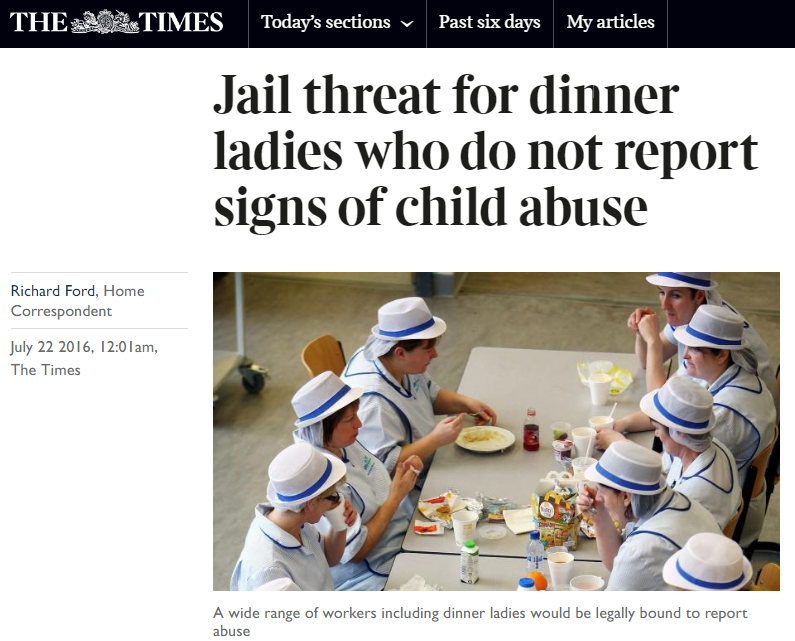The key difference between IICSA’s Recommendation 13 and the Home Office proposal
The key difference between IICSA’s Recommendation 13 and the Home Office proposal (see further down) is marked in red in both cases. It is this difference which means that (whatever they might choose to call it) the Home Office proposal is not mandatory reporting.
IICSA’s Recommendation 13
| Recommendation 13: Mandatory reporting
The Inquiry recommends that the UK government and Welsh Government introduce legislation which places certain individuals – ‘mandated reporters’ – under a statutory duty to report child sexual abuse where they:
The following persons should be designated ‘mandated reporters’:
For the purposes of mandatory reporting, ‘child sexual abuse’ should be interpreted as any act that would be an offence under the Sexual Offences Act 2003 where the alleged victim is a child under the age of 18. Where the child is aged between 13 and under 16 years old, a report need not be made where the mandated reporter reasonably believes that:
These exceptions should not, however, apply where the alleged perpetrator is in a position of trust within the meaning of the 2003 Act. Where the child is under the age of 13, a report must always be made. Reports should be made to either local authority children’s social care or the police as soon as is practicable. It should be a criminal offence for mandated reporters to fail to report child sexual abuse where they:
|
Home office Proposal
Who the duty should apply to
1. The duty should apply to any person undertaking regulated activity in relation to children (under the Safeguarding and Vulnerable Groups Act 2006, as amended) and any person in a role considered relevant to the duty. A list of these roles will be set out in due course.
2. Organisations which engage with children through the above categories should notify relevant individuals of their responsibilities under the duty.
What should be reported
3. Those subject to the duty must make a report when, in the course of undertaking regulated activity or one of the specified roles, they receive a disclosure of child sexual abuse from a child or perpetrator; or personally witness a child being sexually abused. The duty will not apply outside of the relevant activity or role, though in all cases best practice and / or relevant guidance on reporting concerns should be followed.
For the purposes of the duty, ‘child sexual abuse’ should be interpreted as any act that would be an offence under the Sexual Offences Act 2003 where the alleged victim was under the age of 18 at the time the abuse occurred; and ‘witnessing’ child sexual abuse should include viewing indecent images of children.
A report will not need to be made under the duty if those involved are between 13 and 16 years old, the relationship between them is consensual and there is no risk of harm present.
Process for reports
4. Reports should be made to either local authority children’s services or the police as soon as reasonably practicable.
Territorial extent of the duty
5. The territorial extent of the duty to report is England only. Subject to the conditions of point 3 (above), abuse which relates to a child normally resident in other jurisdictions will be reported under the duty, though the subsequent action taken may follow different processes.
Consequences of breaching the duty to report
6. Breaches of the duty to report will be subject to referral to the Disclosure and Barring Service for barring consideration using existing arrangements under the Safeguarding Vulnerable Groups Act 2006. Barring decisions will take account of representations made by the individual.
7. All regulated professionals and teachers who are subject to the duty, including those working in private education and healthcare settings, will also be at a minimum subject to professional sanctions to be determined by the appropriate regulating body.
Preventing reports from being made
8. Anyone who obstructs or delays a mandated reporter from making a report under the mandatory reporting duty (or attempts to do so), for example through destroying or hiding evidence; applying pressure, threats, bribes or blackmail will be guilty of a criminal offence, which will be included on the list of automatic barring offences. As a result, all convictions will result in a referral to the Disclosure and Barring Service (DBS); barring decisions will take account of representations made by the individual.
9. As above (point 3), a report will not need to be made under the duty if those involved are between 13 and 16 years old, the relationship between them is consensual and there is no risk of harm present.
Protections for reporters
10. The duty will set out that individuals are protected from any repercussions by their employer or wider organisation as a result of a making a report in good faith; or alerting appropriate authorities that a report which should have been made under the duty has been withheld.
11. We will also set out that reports made under the duty do not breach any obligation of confidence owed by the person making the disclosure, or any other restriction on the disclosure of information.
Provided Mandate Now 22.11.23
